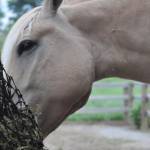Forage-Only Diets for Horses Require Supplementation

Does anything smell as good as a loft filled with fresh hay? Even the best hay, however, can be missing key nutrients for optimal nutrition. The vitamins in hay begin to degrade fairly quickly after it is harvested. By the time the forage has been stored for a few months, there may be little, if any, vitamin A or E left. These natural losses can be detrimental to a horse’s overall health.
Horses evolved eating nearly continuously throughout the day. Their diets were composed largely of low-quality forage. In today’s world, though, science has led us to develop high-quality grasses, fortified concentrates, and a plethora of nutritional supplements to satisfy dietary needs. Nonetheless, forage is still the basis of any equine diet, making up no less than 50% and up to 100% of total daily intake. Many horses, and especially ponies, do well on moderate-quality forage alone, or forage plus a small amount of grain or fat supplement.
There’s a catch to this, though. If a horse owner does not feed a concentrate according to the manufacturer’s feeding directions, the horse will not consume all the nutrients promised by the guaranteed analysis. Many times, the horse or pony in question does not need as much concentrate as the manufacturer recommends, so how do you supply the nutrients without causing excess weight gain?
Enter a vitamin and mineral supplement from Kentucky Equine Research. These are designed to add micronutrients to a forage-laden diet without adding more calories.
“Vitamin and mineral supplements are essential for horses that are on restricted diets, especially those designed for weight loss or for the carbohydrate-limited horse,” notes Kathleen Crandell, Ph.D., a nutritionist for Kentucky Equine Research. Overweight horses are commonly limited to lesser quality hay, which is likely deficient in nutrients. Easy keepers are usually also in need of proper vitamin and mineral supplementation in the diet.
Each horse is an individual, so nutritional needs will vary according to a given situation, but it can be quite simple to provide your horse with vital nutrients without overproviding calories.
Contact a Kentucky Equine Research nutrition advisor today for help with balancing your horse’s ration.








